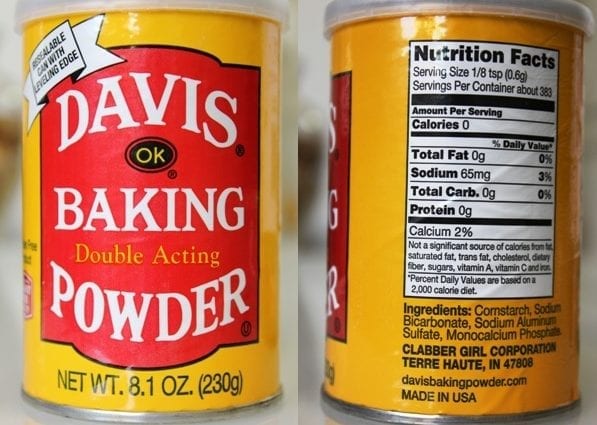Nutritional value and chemical composition.
The table shows the content of nutrients (calories, proteins, fats, carbohydrates, vitamins and minerals) per 100 grams edible part.
| Nutrient | Quantity | Norm** | % of the norm in 100 g | % of the norm in 100 kcal | 100% normal |
| Calorie value | 97 kCal | 1684 kCal | 5.8% | 6% | 1736 g |
| Proteins | 0.1 g | 76 g | 0.1% | 0.1% | 76000 g |
| Fats | 0.4 g | 56 g | 0.7% | 0.7% | 14000 g |
| Carbohydrates | 44.7 g | 219 g | 20.4% | 21% | 490 g |
| Alimentary fiber | 2.2 g | 20 g | 11% | 11.3% | 909 g |
| Water | 6.2 g | 2273 g | 0.3% | 0.3% | 36661 g |
| Ash | 46.4 g | ~ | |||
| Macronutrients | |||||
| Potassium, K | 10100 mg | 2500 mg | 404% | 416.5% | 25 g |
| Calcium, Ca | 4332 mg | 1000 mg | 433.2% | 446.6% | 23 g |
| Magnesium, Mg | 29 mg | 400 mg | 7.3% | 7.5% | 1379 g |
| Sodium, Na | 90 mg | 1300 mg | 6.9% | 7.1% | 1444 g |
| Sulfur, S | 1 mg | 1000 mg | 0.1% | 0.1% | 100000 g |
| Phosphorus, P | 6869 mg | 800 mg | 858.6% | 885.2% | 12 g |
| Trace Elements | |||||
| Iron, Fe | 8.17 mg | 18 mg | 45.4% | 46.8% | 220 g |
| Manganese, Mn | 0.42 mg | 2 mg | 21% | 21.6% | 476 g |
| Copper, Cu | 19 μg | 1000 μg | 1.9% | 2% | 5263 g |
| Selenium, Se | 0.2 μg | 55 μg | 0.4% | 0.4% | 27500 g |
| Zinc, Zn | 0.72 mg | 12 mg | 6% | 6.2% | 1667 g |
| Saturated fatty acids | |||||
| Saturated fatty acids | 0.073 g | max 18.7 г | |||
| 10: 0 Capric | 0.002 g | ~ | |||
| 12: 0 Lauric | 0.009 g | ~ | |||
| 14: 0 Myristic | 0.002 g | ~ | |||
| 16: 0 Palmitic | 0.046 g | ~ | |||
| 18: 0 Stearin | 0.009 g | ~ | |||
| Monounsaturated fatty acids | 0.006 g | min 16.8 г | |||
| 16: 1 Palmitoleic | 0.002 g | ~ | |||
| 18: 1 Olein (omega-9) | 0.003 g | ~ | |||
| Polyunsaturated fatty acids | 0.121 g | from 11.2 to 20.6 | 1.1% | 1.1% | |
| 18: 2 Linoleic | 0.09 g | ~ | |||
| 18: 3 Linolenic | 0.029 g | ~ | |||
| Omega-3 fatty acids | 0.029 g | from 0.9 to 3.7 | 3.2% | 3.3% | |
| Omega-6 fatty acids | 0.09 g | from 4.7 to 16.8 | 1.9% | 2% |
The energy value is 97 kcal.
- tsp = 5 g (4.9 kCal)
- 0,5 tsp = 2.5 g (2.4 kCal)
Baking powder food, baking powder (replacing yeast), with a low content. sodium rich in vitamins and minerals such as: potassium – 404%, calcium – 433,2%, phosphorus – 858,6%, iron – 45,4%, manganese – 21%
- potassium is the main intracellular ion that takes part in the regulation of water, acid and electrolyte balance, participates in the processes of nerve impulses, pressure regulation.
- Calcium is the main component of our bones, acts as a regulator of the nervous system, participates in muscle contraction. Calcium deficiency leads to demineralization of the spine, pelvic bones and lower extremities, increases the risk of osteoporosis.
- Phosphorus takes part in many physiological processes, including energy metabolism, regulates acid-base balance, is a part of phospholipids, nucleotides and nucleic acids, is necessary for the mineralization of bones and teeth. Deficiency leads to anorexia, anemia, rickets.
- Iron is a part of proteins of various functions, including enzymes. Participates in the transport of electrons, oxygen, ensures the course of redox reactions and activation of peroxidation. Insufficient consumption leads to hypochromic anemia, myoglobin-deficient atony of skeletal muscles, increased fatigue, myocardiopathy, atrophic gastritis.
- Manganese participates in the formation of bone and connective tissue, is part of the enzymes involved in the metabolism of amino acids, carbohydrates, catecholamines; essential for the synthesis of cholesterol and nucleotides. Insufficient consumption is accompanied by a slowdown in growth, disorders in the reproductive system, increased fragility of bone tissue, disorders of carbohydrate and lipid metabolism.
Tags: calorie content 97 kcal, chemical composition, nutritional value, vitamins, minerals, what is useful Baking powder food, baking powder (replacing yeast), with a low content. sodium, calories, nutrients, useful properties Food baking powder, baking powder (replacing yeast), with a low content. sodium










